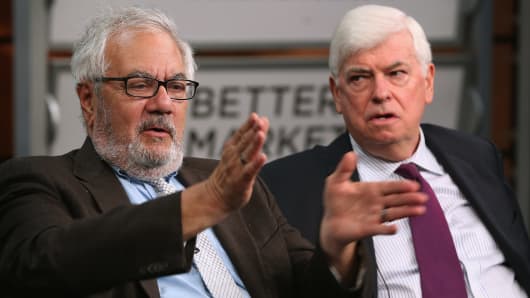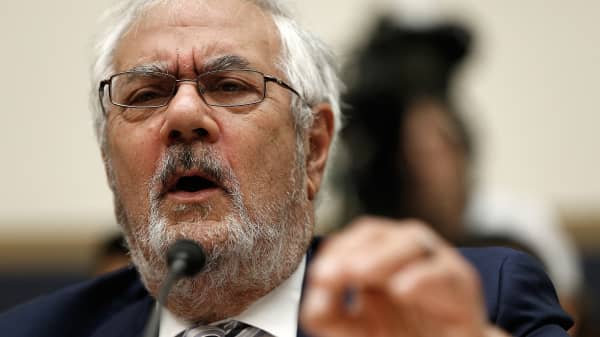There is one legislative issue on which I am strongly supportive of a change that will benefit Signature: raising the $50 billion asset level at which a bank becomes subject to the extra supervision of the Financial Stability Oversight Council. Fortunately for my conflict-minimization effort, I publicly supported this in 2013 - years before I had ever heard of Signature - when I expressed my agreement with a speech by then Federal Reserve Governor Dan Tarullo advocating both the increase in the $50 billion figure and the formal exemption from the Volcker Rule for banks under $10 billion in assets. I have since then been an equally strong advocate of Congressional action to make both changes.
I believe that the Financial Stability Oversight Council will function better if it can focus its efforts on the larger banks. I also agree with the view that the best way to promote competition with the mega-banks is to allow some organic growth in the regionals up to $100 billion.
The case for relief for the smaller institutions—not just on the Volcker rule but in letting them make a wider range of mortgages if they keep them in their portfolios-is also pro-competitive. And both measures respond to legitimate complaints that the community institutions are being burdened by remedies for wrongs they did not commit. It is even more important as a way to defuse opposition to the basic regulatory framework we enacted in 2010 without diminishing its force in any serious way.
This leads me to my two serious objections to the proposed amendments. Raising the asset floor for automatic Financial Stability Oversight Council inclusion to $250 billion is a major mistake. While there is an arbitrary element to any specific number, going from 50 to 250 billion is much closer to a qualitative change than a quantitative one. Since prudent planning must take into account the failure of more than one financial institution in a crisis situation, it is relevant to note that the collapse of three $250 billion banks puts us at the asset level of the triggering event of the 2008 crisis—Lehman Brothers. Three failures at $100 or $125 each billion poses a much smaller threat.
As to community banks, since many of the statutory prohibitions against irresponsible loans will stay in place under the proposed bill—e.g. no negative amortizations—allowing then to make some currently restricted loans if they keep them in portfolio is socially responsible. But the logic of this change offers no rationale for the 1,000 percent increase in the exemption the bill gives to banks from the Home Mortgage Disclosure Act -allowing 500 mortgages a year per institution instead of 5 before this important has tool in fighting racial discrimination must be deployed. We should be strengthening our efforts against racial unfairness, not weakening them.
I favor further moves in to ease the way for the local banks—specifically, flexibility in the thick set of laws aimed at terrorism financing, drug smuggling, and sanctions evasion. But it is no time—and may never be—to relax the fight against racial unfairness.
There are many other provisions of the bill which I support, a few with which I disagree, and some on which I am seeking information. I look forward to the debate on these ahead, but the last point I want to make here deals not with the substance of that discussion but its tone.
Much of what Congress has been considering this year has been about the fundamentals of public policy—whether or not we should as a society be fighting climate change or providing health care to each other or—as in the bill which passed the House-return to the days of a dangerously unregulated financial system. And the debate has been angry—appropriately so in many cases on the part of those of us who are defending fundamental moral values. The question to be answered in the debate on the legislation I am discussing here is whether we can differ about the specifics of how to achieve agreed upon goals without impugning each other's motives or grossly exaggerating differences.
There are two very important aspects of the Senate Banking Committee amendments: what they include, and even more importantly, what they don't. If that bill became law tomorrow, well over 90% of the Wall Street Reform bill would be unchanged. The Consumer Financial Protection Bureau; the strict regulation of derivative trading; the orderly liquidation authority; the risk retention requirements on securitizations and most other provisions would remain in full force. There would be no change at all in the law as it applies to J.P.Morgan Chase; Bank of America; Wells Fargo; Morgan Stanley; Citicorp; or Goldman Sachs. Limitations on allowable mortgages would relax only for the smallest banks. While Trump appointees will unfortunately fail to use many of the powers the law provides, they will remain undiminished on the books, for the use of a future administration.
In other words while I disagree with the Democratic Senators who drafted this bill on the two points I cited above, it would be wholly inaccurate to accuse them of undermining the basic regulatory regime adopted in 2010. In fact, all of the Democratic sponsors of these amendments who were in Congress at that time voted for it and they understand that passing a bill which responds to the major concerns of the community and regional banks will have the important effect of defusing their support for more fundamental changes. And I believe they are prepared to make clear to their Republican colleagues that insistence on rolling back other sections of the law would mean no action at all.
Amendments fixing the two issues I cited above would make this an easy yes for me. Any dilution of other parts of the law would make it an easy no.
Commentary by Barney Frank, chair of the House Financial-Services Committee from 2007 to 2011, during which time Congress enacted the TARP program and the financial-reform bill known as Dodd-Frank. Follow him on Twitter@BarneyFrank.
For more insight from CNBC contributors, follow
@CNBCopinion
on Twitter.





